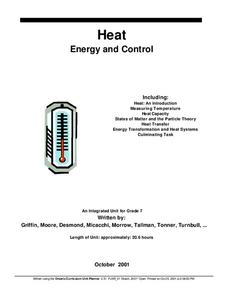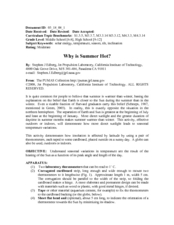Curated OER
The Great Heat Escape
Students observe a demonstration on the role of thermal conductivity in heat transfer. In this thermal conductivity lesson, students design and conduct an experiment to compare the thermal conductivity of four substances. Lesson...
Curated OER
Calorimetry Problems
In this calorimetry worksheet, students complete 30 problems. They calculate the change in heat of a system given the mass and the change in temperature of the system. Students also find the final temperature of a reaction given the...
Bonneville
Making the Standard Solar Heater
Heat up a lesson on solar energy. The first of three parts in the Experimenting with Solar Heaters unit has scholars construct solar heaters. They then use them to heat up a container of water and calculate the amount of heat energy...
Curated OER
Energy from the Sun
In this energy worksheet, learners conduct an experiment and observe the various ways in which heat energy can be transferred. They explain what happened to the wooden block when it was placed in direct sunlight. Students also explain...
Curated OER
Energy Resources and Transfers
For this heat and temperature worksheet, students decide how 4 objects transfer their heat energy. Students answer 8 short answer questions involving energy resources and transfers.
Exploratorium
Give and Take
Heat-sensitive liquid crystal sheets are available in a variety of sizes and temperature ranges. Purchase a class set of hand-held sheets and color half of each with a silver permanent marking pen. Learners of light can hold them under a...
Virginia Department of Education
Heat Transfer and Heat Capacity
It's time to increase the heat! Young chemists demonstrate heat transfer and heat capacity in an activity-packed lab, showing the transitions between solid, liquid, and gaseous phases of materials. Individuals plot data as the changes...
It's About Time
Exploring Energy Resource Concepts
Please turn off the lights to conserve energy. Or not, after all energy is always conserved. This first lesson in an eight-part series includes three parts. Part A contains one hands-on activity and two inquiry-based experiments on heat...
Teach Engineering
Light vs. Heat Bulbs
Careful, that light bulb is hot! Compare heat and light energy using a simple light bulb. The exercise addresses energy conservation and presents actual calculations to determine the most cost-effective light bulb.
American Chemical Society
Energy Changes in Chemical Reactions
Some chemical reactions produce heat, but what is really going on? Lesson focuses on the concept of energy changes, both exothermic and endothermic. Scholars perform multiple experiments, hands-on activities, and view videos of the...
US Department of Energy
Solar Cooking
Who needs a barbecue grill to cook hot dogs when you have the amazing power of the sun at your disposal? Engage young scientists in learning about solar energy with this fun activity that turns a used Pringles can into a solar powered...
National Energy Education Development Project
The Science of Energy
Did you know the word energy comes from energeia, a Greek word? Introduce learners to the four types of potential energy, five types of kinetic energy, and energy transformation with a presentation about where we get our energy and how...
American Chemical Society
Does Temperature Affect Dissolving?
When making sweet tea, why do people dissolve the sugar in hot tea instead of cold tea? The class discusses the previous lab and builds upon it. Working in groups, they design an experiment to determine how temperature affects the...
Curated OER
How Hot Is It?
Discuss the difference between conduction, convection and radiation of thermal energy, and complete activities with your class by investigating the difference between temperature, thermal energy and the heat capacity of different materials.
Curated OER
Energy and Control
Seventh graders construct a lunch box that maintains functional temperature zones and does not allow heat transfer between the zones. They examine the transfer of heat, the capacity of certain materials to hold heat, and how the...
Curated OER
Why is Summer Hot?
Students examine how variations in temperature are due to the Sun and length of day. In this solar instructional activity students complete a lab activity using thermometers and artificial sunlight to see how the earth is heated.
Curated OER
Chemistry Lab-Heat of Fusion
Students determine the heat of fusion of ice. In this heat of fusion lesson plan, students use a calorimeter to measure the molar heat of fusion of ice. Students determine the heat required to melt one mole of ice using hot water and ice...
Curated OER
Why is it so hot when I sit next to the window?
Students investigate how energy travels through glass. In this energy usage lesson, students conduct an experiment in which they decide if window film affects how much energy travels through the glass. Students use a journal to make...
Urbana School District
Thermodynamics
Entropy, it isn't what it used to be. Presentation includes kinetic-molecular theory, heat and internal energy, thermal equilibrium, temperature scales, laws of thermodynamics, entropy, latent heat of fusion, specific heat, calorimetry,...
Center for Learning in Action
Water – Changing States (Part 2)
Here is part two of a two-part instructional activity in which scholars investigate the changing states of water—liquid, solid, and gas—and how energy from heat changes its molecules. With grand conversation, two demonstrations, and one...
Next Generation Science Storylines
Why Do Some Things Get Colder (or Hotter) When They React?
Some reactions absorb heat while others release it. Young scholars investigate both types of reactions in a 12-lesson unit. Each lesson presents a lab investigation that monitors temperature and considers the types of reactions taking...
CK-12 Foundation
Hot Oven
Why does the air in a hot oven not burn skin, but metal in the oven does? The simulation focuses on the difference between temperature and thermal energy and the way these are transferred. Scholars adjust the temperature of an oven and...
American Chemical Society
Preparation and Combustion of Biodiesel
The United States is the world's largest producer of biofuel. During an in-class investigation, young scientists produce their own biodiesel. They burn a sample of it to determine the heat of combustion. Then they discuss the results...
Curated OER
Specific Heat
In this specific heat worksheet, students are given examples to find the specific heats of substances and to use the specific heats to find the changes in temperatures of substances. Students solve eighteen problems using what they...

























